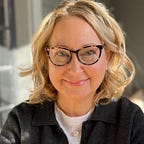Becoming Care-Prepared
It was a pre-pandemic world when I decided to return to grad school to research care, empathy and entrepreneurship at NYU. Prompted by my childhood experience with loss and intergenerational grief, 20 years as a life coach, losing a dear friend to metastatic breast cancer, and then a family member receiving a bad diagnosis, I felt called to help people better care for each other.
As I glimpse my virtual graduation, I want to share what I’m learning and thinking about, particularly relevant to those of us simultaneously caring about the wellbeing of our parents, our children and ourselves. Studying gerontology has been particularly eye-opening as we witness the ballooning caregiving crisis due to the elder boom. I want to make sure that while COVID-19 is still a factor in our lives, we seize this opportunity to discuss care preparedness with our family and friends.
I am especially interested in the caring conversations we have throughout our lives: how we lovingly talk to each other in an effort to get our care needs met today and in the future. I want you to know who will take care of you and your loved ones when help is needed, even if you live alone. This may not seem important right now, but let me say loudly that it is. What does your support system look like? What resources are available and lacking? Try mapping it out.
These caring conversations can be awkward and uncomfortable but are necessary. I agree with palliative care advocate Kathy Kortes-Miller who says in her TED talk, “If dying is always a part of our living, doesn’t it only seem logical then that we spend some time thinking about it, planning for it, and talking about it?” I am reminded of a coaching exercise, Begin with the End in Mind, where clients are encouraged to reverse-engineer their legacy by first writing their own eulogy. I don’t want us to wait until it’s too late to plan, to build relationships or satisfy anything that feels unfinished.
I get that this is not sexy subject matter, but it’s so much easier to talk about tough stuff before you are forced to. If you or family members do not yet have a will, advance directive, or healthcare proxy, the wrenching Netflix documentary Extremis about what families face when they have not discussed end-of-life wishes will catapult you into action. Resources such as The Conversation Project or The Five Wishes are a great place to start.
For a deeper dive into the caringscape, I recommend books like The Age of Dignity by Ai-jen Poo, When Caregiving Calls by Dr. Aaron Blight, How We Show Up by Mia Birdsong, and How to Be a Friend to a Friend Who Is Sick by Letty Pogrebin.
Care activists and organizations like the National Alliance for Caregiving, and Caring Across Generations are campaigning for improved care infrastructure and policies like Universal Family Care to make care affordable and accessible to everyone.
While still undervalued and underreported, the topic of care and caregiving will inevitably touch us all. I encourage you to be the conversation starter in your family.
I’d be grateful for your thoughts/experiences/wisdom. Please reach out to ilysse@thrivewell.com or find me at caregiveher on IG. Thank you kindly.
